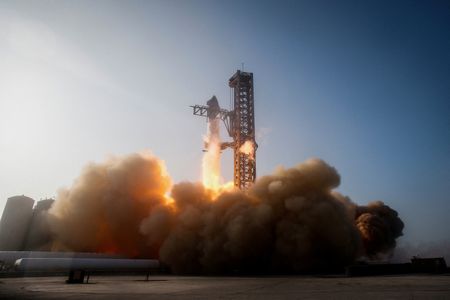By Joey Roulette
WASHINGTON (Reuters) – The FAA on Wednesday granted SpaceX a license to test-launch the company’s Starship rocket system from Texas, according to the agency’s website, paving the way for another early demonstration of a spacecraft crucial to Elon Musk’s satellite launch business and NASA’s moon program.
“The FAA determined SpaceX met all safety, environmental, policy and financial responsibility requirements,” the Federal Aviation Administration (FAA), which oversees launch site safety, said in a statement.
The regulatory sign-off came less than 24 hours before Starship’s targeted launch time of 7 a.m. CDT (1200 GMT)on Thursday from SpaceX’s Boca Chica, Texas, launch facilities, where the rocket’s first two attempts to reach space blasted off from last year.
Starship, a towering two-stage rocket system that will become the centerpiece of Musk’s space launch business, will aim to fly farther and clinch more testing objectives than its last two flight tests, including the reignition of the system’s upper stage engine and opening its payload door in space.
Unlike the last two tests, both which ended in explosions before reaching a planned splashdown target in the Pacific Ocean near Hawaii, the Thursday test flight will launch on a trajectory bound for the Indian Ocean, a flight profile picked by SpaceX to enable the mission’s new test objectives, the company said.
Starship’s window to launch on Thursday – and on Friday, as a backup – is from 7 a.m. to 8:51 a.m. CDT (1200 GMT to 1351 GMT), SpaceX said.
NASA, under a roughly $4 billion contract with SpaceX, plans to use Starship in the next few years to send the first crew of humans to the moon’s surface since the Apollo era more than half a century ago.
The upcoming Starship test is an early demonstration on a long path to prove itself capable of safely getting astronauts to the moon, a feat that will involve other NASA spacecraft and require extra fuel for Starship supplied in space by a fleet of “tanker” refueling Starships.
SpaceX CEO Musk has said the rocket should fly “hundreds” of uncrewed flights before humans climb aboard. NASA officials in recent months have stressed a need to see faster progress on the rocket’s development as it races with China, which envisions its own crewed moonshot by around 2030.
The FAA’s commercial space office issued the license with a tight workforce that has struggled in recent years to keep pace with an uptick in private launch activity driven mainly by SpaceX and its novel Starship tests.
The agency this week proposed a $57 million budget for its space office for fiscal year 2025, a 36 percent increase largely meant to grow its regulatory staff and kickstart development of potential regulations for more novel private space activities.
(Reporting by Joey Roulette; Editing by Sandra Maler)




